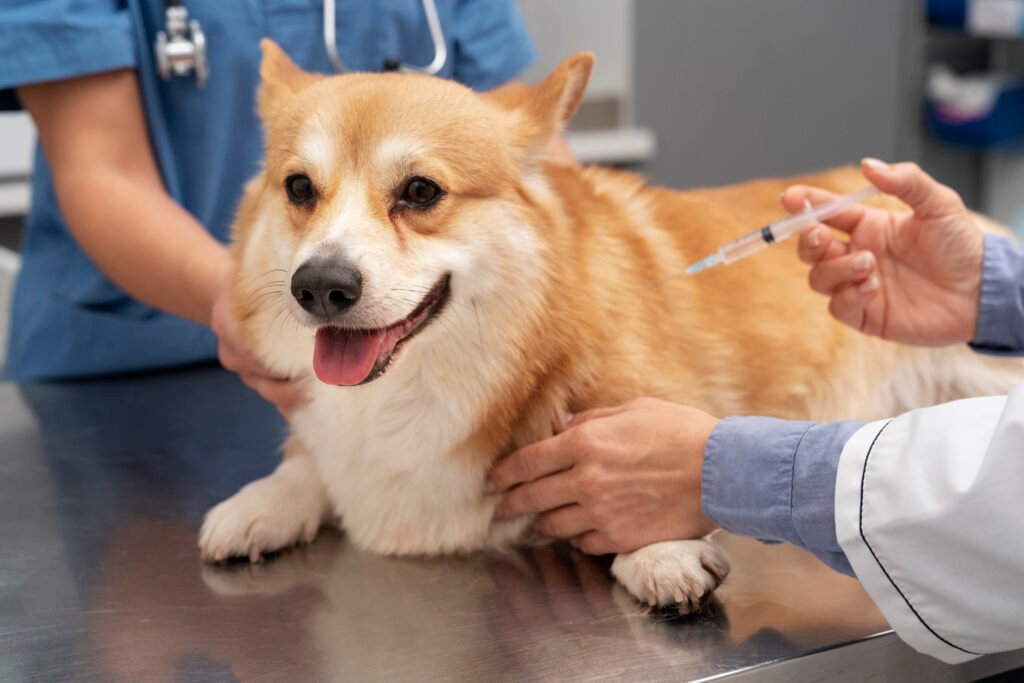Vaccine Side Effects in Animals
Vaccines are critical in protecting pets from serious and sometimes deadly diseases. While vaccines are designed to be safe, they may cause adverse effects in some cats. Dog vaccine side effects are usually mild, such as a low-grade fever or fatigue and redness at the injection site that is resolved in 24-48 hours. In some even rarer cases, pets develop more severe symptoms such as an adverse reaction or responses that linger and take longer to resolve – these are the ones you might need help from your veterinarian on.
The problem with the concept of normal functioning is that it could overlook warning signs you should have… in turn putting your pet at unnecessary risk. This knowledge ensures that pets are given the protection they require from being vaccinated as long as it stays completely safe and healthy. Given the potential hypersensitivity of some pets, it is important to work with a veterinarian in determining an individualized vaccination plan.

Common Dog Vaccine Side Effects
There are a few common side effects that pets might experience after receiving the vaccine. These are generally mild and temporary, most often occurring shortly after the vaccination and going away within a day or two. Common side effects include the following:
Moderate Fever — Developing a slightly warm fever is normal as the vaccine (again with their immune system) responds to the shot. This fever is usually mild and will go away within 24 or 48 hours.
Whining can also be a way dogs let you know they are in some discomfort, and as we said earlier lethargy or decreased activity is common after your dog receives ANY type of vaccination. The depression generally sticks around for a day or so before the animal starts to get back to normal health.
The skin hurts: the injection site may increase slightly, get hot and hurt. They will generally use a stunt nose after an experience of days, however this is absolutely nothing to fear unless the situation declines or recurs an excessive amount of.
Decreased appetite: The animals are not eating much or reduced interest in food will be seen immediately after the vaccination. This effect is often short-lived as the pet starts to feel better.
Mild Signs of Respiratory Infection: Sometimes, pets experience mild respiratory signs like runny nose or sneezing following an intranasal vaccine. Most of these symptoms are mild and will go away on their own.
Although these side effects are normal, and very mild in most of the cases; pet owners must keep an eye on their pets after they have received a vaccine dose for any uncommon or severe symptom.

Normal Dog Vaccine Reactions and Signs for Vet Attention
It is important to know how best to differentiate between normal post-vaccine reactions and the more serious side effects that could arise, as this would determine their health. I know, it sounds confusing but this is the key indicator that separates mediocre from great.
Typical Post-Vaccine Side effects
Low grade fever: Fever is a natural response to an immune system that has been alerted and mobilized into action (prior formal avoidance & sniffing procedure) so this usually isn’t normally anything of concern unless it lasts well over 48 hours.
Sluggishness: After having a vaccination, most pets will be quiet or sleepier than usual. They are typically back to their regular behavior the next day or two once they are done melting.
Very slight localized swelling a few days after the shot, tenderness or small lump at the time of injection that will drop significantly within hours Detection.
Minimal Loss Of Appetite: Animals might eat little or show no interest towards food for a small period of time after vaccination. It is normal for their appetite to return within 24-48 hours.
Veterinary Attention — Serious Side Effects:
If the fever is high, persists for over 48 hours and worsens or if your pet remains lethargic this could mean a more dangerous response.
- Mild Gastrointestinal Upset: Mild diarrhea or vomiting can sometimes occur, but if the symptoms persist for over 24 hours (48 in younger pups) then they should be taken to a vet.
- Shortness of breath, or swelling in your face: These symptoms may be a sign of an allergic reaction (anaphylaxis). This is an emergency situation. Owners should if their pet is having difficulty breathing, has swelling of the face or around the throat or has been aware.
Collapse or Seizures – some pets can fall into a very deep sleep, shake violently (having seizures) and appear to almost be in a coma. These types of symptoms are severe and mean you need to seek emergency care.
Persistent Pain or Swelling at the Injection Site: If injection site swelling becomes very large, hardens, remains for more than a week or if your pet seems painful and is not improving then an assessment by the vet is needed.
Knowing what to look for, watching your pet and seeking medical attention if needed may make a difference between life or death.

Vaccine Reaction Risks in Pets and Risk Reduction
Some pets are more susceptible to experiencing vaccine adverse effects, but it is safe if you know what makes these risks the highest.
Here are some pets more likely to have an adverse reaction:
- Puppies, kittens and smaller dog breeds: Smaller pet vaccine reactions are far more common in puppies, kittens or toy breeds, as their immune systems may not be so mature enough to cope up with the stress of immunization. Their smaller physiques could mean that they respond with more sensitivity to the amount of vaccine in a dosage.
- Pets with Allergy Background: Pets that have experienced allergic responses to previous vaccines, or other substances – food allergens and environmental allergens are at a higher risk of developing an adverse reaction to vaccination. These pets may be immunologically more reactive.
- Certain Breeds: There are reports of increased incidence in vaccine reactions for some specific breeds such as Dachshunds, Pugs and particular Terrier breeds. They might be more vulnerable genetically.
Senior pets might also be at higher risk of developing a vaccine reaction, as age-related immune system changes can reduce their ability to tolerate vaccines. Their bodies just might not process the vaccine as effectively.
- Pets with Pre-existing Conditions: Pets who suffer from health problems like diabetes, cancer or auto-immune diseases may have more severe adverse reactions. Their lowered health can affect their vaccine responses.
Minimizing the Risks:
- Create a Vaccination Schedule with your Veterinarian: It is important to develop an individualized vaccination plan based on the unique lifestyle and risk factors of each pet. Such a plan should account for your animal’s age, breed, health status and lifestyle as well any previous reactions they’ve had. Especially avoid extra vaccines and stretch out vaccination if possible because of their weight.
- Pre-Vaccination Testing: For those at high risk, your vet may suggest pre-vaccine testing such as bloodwork to provide an overview regarding the general health of your pet and predict how the vaccine will work.
- Post Vaccination Observation: Observe your pet for the rest of the day and night, after receiving vaccination pendants at Your Pet’s health club as he may develop sudden injection reaction. For pets who have had a previous reaction and know what to look out for, we can often cut this time down, If your pet has previously reacted or you want more guidance on what to do next.
Alternatives: Your vet might give up on routine vaccination and employ alternatives such as titer testing that tests the levels of immunity in place. This strategy can help to prevent false vaccinations.
Pre-Medication: In certain cases, your vet may suggest that they pre medicate with antihistamines or other medications to decrease the chance of an allergic response for example in similar instances as when allergies have been found before.
You will decrease the risk and keep your fur baby as safe as he can be when it comes to his shots, by recognizing those who are most likely going to react badly — and acting on that beforehand.
